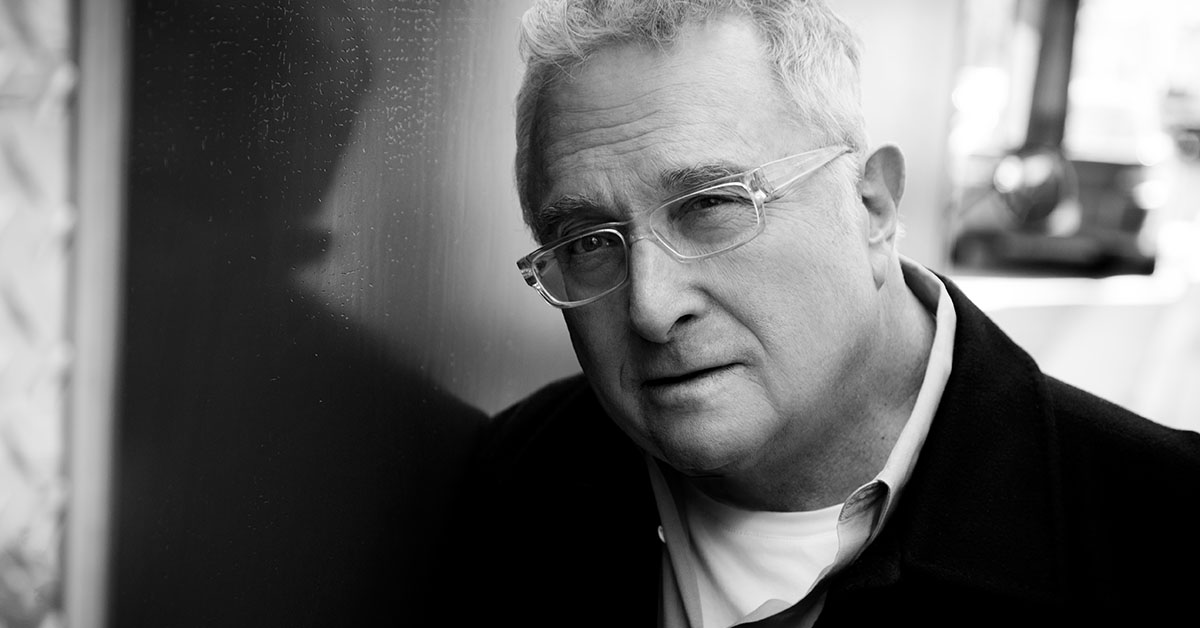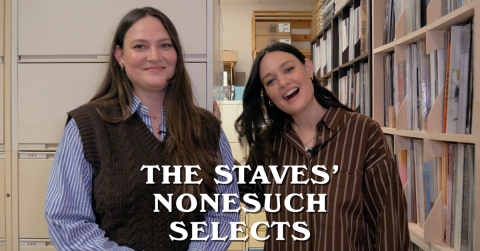Randy Newman releases Dark Matter, his first album of new material in nine years, on Nonesuch on August 4. Produced by long-time Newman collaborators Mitchell Froom, Lenny Waronker, and David Boucher, the album includes songs about Vladimir Putin, the Kennedy brothers, Sonny Boy Williamson, science vs. religion, love and loss, and more. Here, Newman speaks with writer Michael Hill about the project and how it came to be.
Dark Matter is Randy Newman's first studio album of all-new material since the 2008 release of his acclaimed Harps and Angels, an acerbic take on the state of America that Rolling Stone called "reason to wrap yourself in the flag and cheer." The ensuing years have proven Newman to be more prognosticator than mere commentator—his "A Few Words in Defense of Our Country," its lyrics printed on the Op-Ed page of the New York Times in January 2007, seems even more relevant today, though by no means reassuring. On Dark Matter, Newman jumps right back into the fray, opening the disc with the grand "The Great Debate" a nearly nine-minute opus that feels like the opening number of a zany musical, featuring scientists, religious zealots, and a gospel choir, arguing about the existence of evolution, dark matter, climate change, and religion. It includes a character who steps up to question the merits of a certain Mr. Randy Newman's songwriting gambits. It's by turns cynical and gleeful, and, in the end, true believers and skeptics alike surrender to the sheer musical joy of a catchy gospel coda, with no commitment of faith necessary.
As the album unfolds, it's clear that Newman isn't just going after the big targets, though he does dedicate a cheerfully bombastic tune to Vladimir Putin, conjuring up a choir of salacious "Putin Girls" to extol the Russian leader's patriotism, his tractor-driving skills, and, of course, his impressive shirtless physique. But Newman's storytelling takes a more intimate, character-driven approach on much of Dark Matter. He imagines an Oval Office conversation between John Kennedy and his brother Bobby before the Bay of Pigs Invasion, in which JFK confesses a hitherto unreported love for Cuban singer Celia Cruz (and a concern for her safety). On "Sonny Boy," he envisions the original Sonny Boy Williamson, up in heaven, recounting the true story of discovering that a younger blues musician had stolen his name and his tunes and rose to fame during the British invasion and well beyond. The characters in "On the Beach" and "Wandering Boy"—a surfer dude mired in the sand for life in the former, a father wistfully recalling his long absent son's promising younger years in the latter—are either trapped in the past or full of nostalgia.
Newman tempers his critiques with a tenderness that often comes through in his brilliant, cinematic arrangements: lighthearted café jazz runs counter to the sad tale that is "On the Beach"; the unadorned piano on "Wandering Boy" closes out the album on an understated, poignant note. On artfully orchestrated songs like "Lost Without You" and "She Chose Me," Newman is straightforward with his emotions as well as his melodies. There is no reading between the lines on these tracks. "She Chose Me," destined to be covered by many a discerning singer, is an unabashed love song, something that Newman always usually offers at least once on each of his albums. Although, as he says, "I may have fewer than any writer in pop music, I think. I can tell you, I would have a bigger house if that's all I did."
As London's Guardian put it after the release of Harps and Angels, Newman "is able both to rail against the nonsenses that attend the end of the American empire, and go with the sweeter possibilities of the American dream. Though you never doubt his occasional existential despair, he never really stays down for much more than five minutes." Newman uses sardonic humor to get some serious points across. As he explains, "I've always liked to make people laugh, but it's not very often what the medium is used for. But I like to, I'll always do that—I can't help it."
Fans who have seen Newman on his recent concert tours have already heard some of the songs that comprise Dark Matter. And, like "A Few Words in Defense of Our Country," his "Putin" track was released as a digital single at a crucial moment in politics, right before the 2016 U.S. presidential election—premiering, appropriately enough, via the Washington Post website. Newman declared at the time, "Here's a song dedicated to a great world leader. I hope you like it. I know he will."
Newman, who has kept an active film scoring and performing schedule in recent years, had no overarching concept in mind as he worked on his new material, but he began to discern some connective thematic tissue as his composing progressed. "I was just writing songs," he recounts, "and if there is anything consistent about the songs, there is often more than one voice, in the big ones, and it's different for me, a difficult thing to bring off, to make it comprehensible," he says. "I think it works. They cover more ground than most songs do and portray a number of different characters. Audiences are smart. They'll understand the songs. I hope they like them as well."
For Dark Matter, Newman reassembled his production team from Harps and Angels and The Randy Newman Songbook collection, solo piano renditions of his best-known work, which he has been assembling over the past decade: producers Mitchell Froom and Lenny Waronker and producer-engineer David Boucher. Waronker, the legendary former president of Warner Bros. Records, has been a lifelong friend and collaborator of Newman's, arguably his most ardent supporter and fan since they were kids together in Los Angeles. Froom, whose producing career Waronker also helped to nurture, has become an essential sounding board for Newman, particularly on Dark Matter: "He helped on this record in a different way than anyone has before. He'd come over and sometimes perform an editing function. Writing is not so much about having an idea as having too many choices. I'd go down one path and he'd go, 'Don't add that.' No one had ever been there before when I wrote a song. I might have still been there working on them, running in place, so Mitchell was a big help." They assembled an equally stellar band, of relatively young, in-demand L.A. players: guitarist Blake Mills, bassist David Piltch, and drummer Matt Chamberlain.
Along with The Randy Newman Songbook, Nonesuch had also released Live in London, a CD/DVD set documenting a one-night-only concert event, with Newman and the BBC Concert Orchestra, at LSO St. Luke's, a restored, eighteenth-century Anglican church. These discs serve as a Newman primer, showcasing the work of an artist, who, in the words of the U.K.'s Uncut magazine, is the "owner of a peerless canon."
The seventy-three-year-old Newman began his career while still a teen, as a behind-the-scenes songwriter, composing hits for other artist before releasing his Warner Bros. debut, Randy Newman, in 1968, produced by Waronker and Van Dyke Parks. Among its tracks was the sublime, oft-covered "I Think It's Going to Rain Today." Early on, Newman fared better with critics and fellow musicians than with mainstream audiences: in 1970, Harry Nilsson released an entire album of Newman cover, the gorgeous Nilsson Sings Newman. It wasn't until 1977 that Newman enjoyed his own hit with the satiric ballad "Short People." He scored another success with the equally ironic "I Love L.A."
Concurrent with his work as a solo artist, Newman began to establish himself as a Hollywood film composer. That was a familiar world to Newman: as a child, he attended scoring sessions with his uncles, the esteemed composers Alfred Newman, Lionel Newman, and Emil Newman, experiences that helped shape his approach to both songwriting and scoring. He received his first Academy Award nomination in 1982 for Milos Forman's Ragtime, and finally won his first Oscar, after fifteen previous nominations, in 2002 for the song "If I Didn't Have You" from the animated film Monsters, Inc. He won a second time in 2011 for "We Belong Together" from Toy Story 3. Newman also won an Emmy for the title theme of the Tony Shalhoub–starring detective series, Monk, "It's a Jungle out There;" he has fleshed out the theme, something fans has been clamoring for, into a full-length song for Dark Matter. He's also won six Grammy Awards, starting in 1985 with his theme for Barry Levinson's The Natural.
Reviewing the Songbook collection, Uncut praised "the improbable juxtapositions of caustic topicality and heart-wrenching universality, the concise character studies, and singing and piano playing that seem to emanate from the very fabric of America." That remains true with Dark Matter. But Newman is also able to address getting older, the wisdom it sometimes imparts, and the ruefulness it inevitably brings, on songs like "Lost Without You, "She Chose Me," and "Wandering Boy." He continues to gauge the temperature of our nation, in a time where truth, as he illustrates in "The Great Debate," is a dwindling commodity. And he invariably makes us laugh in the midst of our shared troubles.
"I think it's entertaining—I hope it's entertaining—and that's eighty percent of what I try to do," Newman says. "Also, I'm doing something different than I've ever done before. It's a step forward for me. And considering how long I've been doing this, I'm kinda proud of that."
—Michael Hill
- Log in to post comments




Randy Newman - the amazing
Randy Newman - the amazing human. Can't wait for this album.